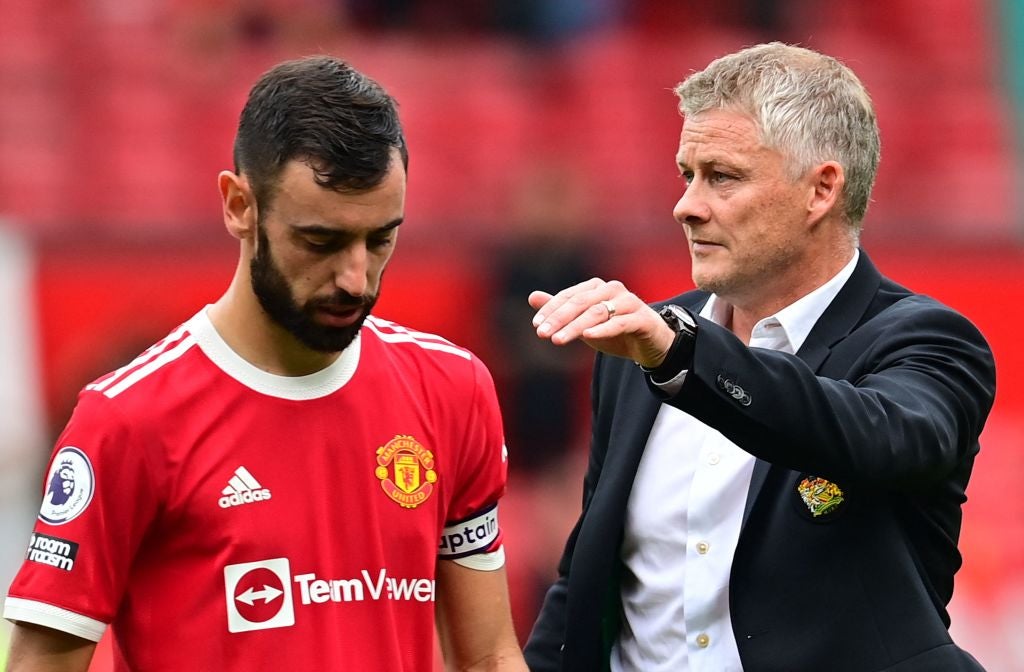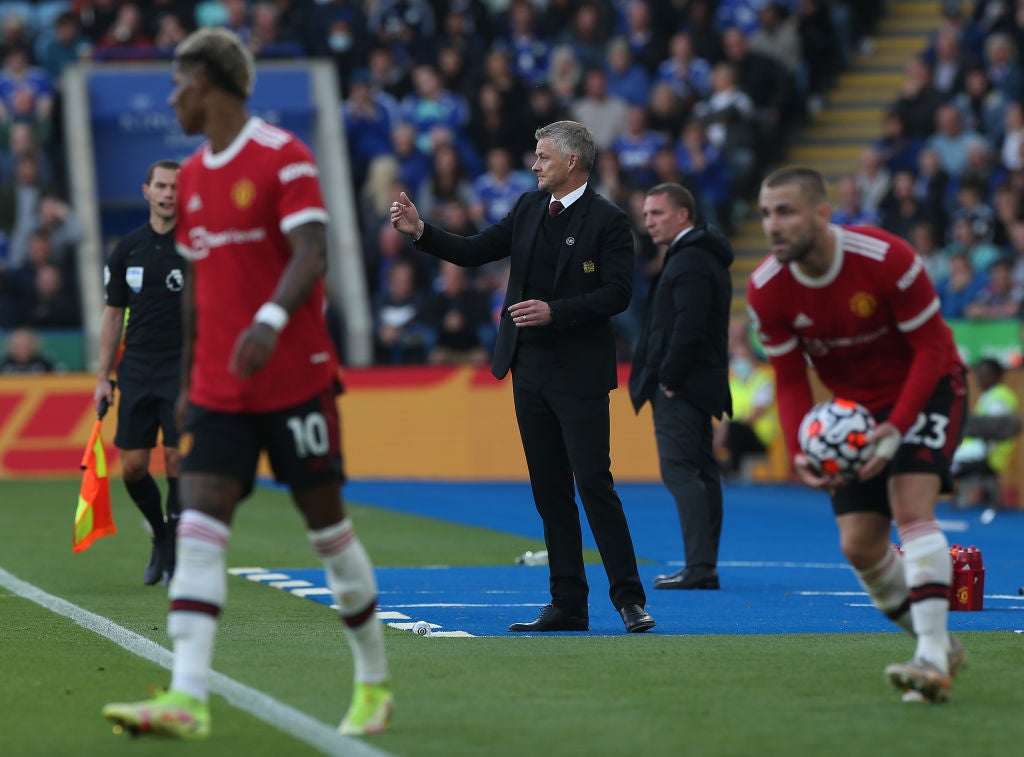Ole Gunnar Solskjaer faces defining weekend as he seeks to regain trust at Manchester United
When Ole Gunnar Solskjaer called a meeting on Tuesday morning, he wanted to let the Manchester United players have their say, but was also intent on stressing one message of his own.
That was to trust him. He urged the players to keep the faith.
That, to be blunt, is also where the problems begin.
A minority of players just don’t trust Solskjaer to play them. An increasing number don’t trust his tactical acumen. They feel they’re going to get out-thought every week. It is all adding up to a dressing room atmosphere that is being described as “poor”, if admittedly more defiant as this difficult week has gone on.
Solskjaer has so far survived that week, and by far the worst match of his time in charge, to oversee a huge game away to Tottenham Hotspur this Saturday.
Whether United actually trust him beyond that fixture is the biggest question of all.
Solskjaer has been given no assurances on his future. He and his staff know they are under intense scrutiny.
That still doesn’t mean anyone knows what will happen next. That might be the biggest problem.
The prevailing view, from a series of sources, is that the United hierarchy don’t yet have a plan for this and are currently trying to figure everything out. The consistent line has been that they never anticipated a change this season, as reflected by their previous 100% backing for Solskjaer, and that they have been “blindsided” by all this.
That should ring alarms of its own since the signs could be seen in so many United performances before this, going back way further than this season. Many would say it points to the lack of true football expertise among the hierarchy. That has resulted in bad decision following indecision, so many elite managers eluding them, and this cycle seemingly repeating itself endlessly.
A proper director of football – which has been another recurring issue – may well have identified much of this, and been capable of implementing a playing ideology that made the next managerial appointment a fairly natural process. It is now anything but natural, as can be seen in the variety of potential options, as well as the confusion.
Some at the top of the club have long favoured Diego Simeone, but know he is close to impossible to get. The most popular choice is Mauricio Pochettino, but he probably won’t be available until the end of the season, if even then. Antonio Conte is available now, but too many in the hierarchy currently have reservations. Sources on the Italian side maintain that Conte believes he has a chance of the job in the near future, but others maintain that is fanciful. It is true that United are concerned about “another Mourinho”, even if those close to Conte are baffled by such a perception. The football people who defend the Italian say it just shows “United want a yes man”.
For the club’s part, there is an awareness of how bad it would look if they were to pursue alternative options behind Solskjaer’s back, given his status at the club. They want to do right by him. It remains possible, however, that is wrong for everyone.
The grand consequence is a widely shared opinion that it is only indecision that has kept Solskjaer in the job, accompanied by a vague hope he can steady the team and hang on, before a more considered decision can be made for the end of the season.
It’s just that stance is dependent on the avoidance of another disaster, and it says much there’s no guarantee of that. Events may well evolve out of the club’s control.
Many in the game would point to the reality that, just as replacing a manager always involves sounding out alternatives before the event, it is exceedingly rare that any coach ever gets out of situations like this.
It is usually too far gone. As soon as you get into a situation where it is almost game by game, or any bad result could force a decision, the fates are set.
Solskjaer doesn’t have to look too far, however, for the modern exceptions.
The Norwegian himself was in precarious situations at two different points last year, when the question of what next was at least being considered by the club.
For the first, in January 2020, they signed Bruno Fernandes.
For the second, after the 6-1 defeat to Jose Mourinho’s Spurs, Solskjaer did manage to rally the team. It helped that Liverpool’s 7-2 defeat to Aston Villa later that same day fostered the idea that was no more than a freak weekend, that could be written off.
The blunt reality is also that Solskjaer had a better connection with the squad back then. In short, they weren’t asking as many questions of him. There was more trust. There was more clarity. This might well be the most influential factor in all this.
Clarity and focus are what Solskjaer needs more than anything right now. This was one key lesson from his very first months at the club as a player, way back in 1996/97, when Sir Alex Ferguson’s United suffered a 5-0 defeat to Newcastle United and a 6-3 loss to Southampton in successive games. His wife Cathy even greeted him at the door after one of those with the chant “Fergie, Fergie for the sack”.
“I have to grasp the nettle and be honest about the areas where we are failing,” Ferguson wrote in his diary of that season. “This is no time to fudge issues or make excuses.”
It was the same after the 6-1 defeat to Manchester City a decade ago. Ferguson went back to basics, setting about “fixing our attention on the defensive part of the team”.
“There was a leak in there that we needed to correct,” he wrote in his second autobiography. “That remedial work led us into a period of stability where we were strong at the back.”
The point is the clarity that comes from breaking it right down, and building the team steadily. It doesn’t feel like there is much clarity to Solskjaer’s approach at all right now. That can perhaps be best seen in his match decisions. The selection of the same XI for Liverpool as against Atalanta baffled the players, as they knew it just didn’t work. Some felt Solskjaer was trying to prove a point, which reflected how the situation meant he was already second-guessing himself.
Others felt it may reflect something deeper.
Cristiano Ronaldo brings goals but it is by now impossible to escape the reality that he also brings a lot of complications.
There is a belief that Solskjaer now thinks he has to play the Portuguese – all the more so after Sir Alex Ferguson’s comments to a UFC fighter were made public, an absurd sentence in itself – but that the manager doesn’t have the tactical imagination to envisage anything other than one possible formation behind Ronaldo. That is this 4-2-3-1 that has such gaps embedded into it, that Liverpool found so easy to play against.
If Ronaldo wasn’t there, Solskjaer may well have been more minded to play the more defensive approach that has served him quite well in big games, and that looked so necessary against Liverpool. Instead, amid so much criticism and so many bad results, he persevered with this.
That is something that has been so jarring of late.
While Solskjaer’s tactical ideas were never exactly sophisticated, there was a clarity to them. He knew how to respond around better sides and ensure an application, as in so many wins over Manchester City.
That clarity is not there right now.
United instead seem to have so many circular problems.
It is clear the team needs some change. Something is wrong with the chemistry of the side as much as the tactics.
The problem is that some changes are dependent on a number of players who have been disgruntled at their lack of use. Even if they will obviously still give 100%, there’s that subconscious seed of doubt. This is why some people believe something in this tenure is now “broken”.
There’s also the argument that this exact 4-2-3-1, and that exact starting XI, may actually perfectly suit a match against Nuno Espirito Santo’s Spurs. So it would be some timing if Solskjaer chose this game to go in another direction.
Saturday is a hugely compelling game because it has the potential to be so bad. These are two sides with deep problems, with both of them in situations where many doubt whether the manager will last the season.
Nuno does have a decent record against Solskjaer, but that was mostly from a period when Wolves were more attuned to his ideas. With Spurs, it’s not so much a problem of tuning as of wavelength. Everything is out of sync. There is confusion and a lack of connection.
That could be even worse for Solskjaer, though. While it’s hard not to believe that United’s much greater individual quality will ultimately beat Spurs, Nuno is still capable of setting up a defence. The flip side is what it would say about United if they lost this game? What then? Would they then be forced to turn to Conte, or the interim that they really want to avoid? This is where we return to the problem of planning.
This is where it reverts to the players.
So much depends on the attitude of the squad as much as anything. It is true there is such disgruntlement that there are a lot of leaks coming out of the dressing room, but also true that the majority still like Solskjaer as a person. They will play for him. But it’s easy to see the exact same cycle playing out again.
United could win the next two games, and maybe even lose badly to City, but there might still be a sense Solskjaer has done enough to persevere. But then what? The deeper problems aren’t exactly going. The only possible hope for the season would be maybe fluking a Champions League, in the way Roberto Di Matteo has done. United should be about much more than that.
Consider the following: many well-connected sources feel that, if Pochettino was available now, United would have acted. But that was exactly the case a year ago, and they didn’t, only to end up here.
Right now, it’s difficult not to trust anything other than the same cycle playing out again.
Source: Read Full Article


